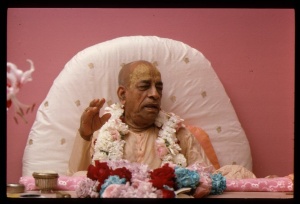SB 5.6.1: Difference between revisions
m (1 revision(s)) |
No edit summary |
||
| Line 1: | Line 1: | ||
{{info | {{info | ||
|speaker= | |speaker=King Parīkṣit | ||
|listener= | |listener=Śukadeva Gosvāmī | ||
}} | }} | ||
[[Category:Srimad-Bhagavatam - Canto 05 Chapter 06|S01]] | |||
[[Category:Bhagavatam Verses Spoken by Pariksit Maharaja - Vanisource|050601]] | |||
<div style="float:left">'''[[Srimad-Bhagavatam]] - [[SB 5|Fifth Canto]] - [[SB 5.6: The Activities of Lord Rsabhadeva|Chapter 6: The Activities of Lord Ṛṣabhadeva]]'''</div> | |||
<div style="float:right">[[File:Go-previous.png|link=SB 5.6 Summary]] '''[[SB 5.6 Summary]] - [[SB 5.6.2]]''' [[File:Go-next.png|link=SB 5.6.2]]</div> | |||
{{RandomImage}} | |||
==== TEXT 1 ==== | ==== TEXT 1 ==== | ||
<div class="verse"> | |||
<div | :rājovāca | ||
rājovāca | :na nūnaṁ bhagava ātmārāmāṇāṁ | ||
na nūnaṁ bhagava ātmārāmāṇāṁ yoga-samīrita-jñānāvabharjita-karma-bījānām aiśvaryāṇi punaḥ kleśadāni bhavitum arhanti yadṛc-chayopagatāni | :yoga-samīrita-jñānāvabharjita-karma-bījānām | ||
:aiśvaryāṇi punaḥ kleśadāni | |||
:bhavitum arhanti yadṛc-chayopagatāni | |||
</div> | </div> | ||
| Line 15: | Line 23: | ||
==== SYNONYMS ==== | ==== SYNONYMS ==== | ||
<div class="synonyms"> | |||
<div | ''rājā uvāca''—King Parīkṣit inquired; ''na''—not; ''nūnam''—indeed; ''bhagavaḥ''—O most powerful Śukadeva Gosvāmī; ''ātmārāmāṇām''—of pure devotees simply engaged in devotional service; ''yoga-samīrita''—achieved by practice of yoga; ''jñāna''—by knowledge; ''avabharjita''—burned; ''karma-bījānām''—of those whose seeds of fruitive activities; ''aiśvaryāṇi''—the mystic powers; ''punaḥ''—again; ''kleśadāni''—sources of distress; ''bhavitum''—to become; ''arhanti''—are able; ''yadṛcchayā''—automatically; ''upagatāni''—achieved. | ||
rājā | |||
</div> | </div> | ||
| Line 23: | Line 30: | ||
==== TRANSLATION ==== | ==== TRANSLATION ==== | ||
<div class="translation"> | |||
<div | |||
King Parīkṣit asked Śukadeva Gosvāmī: My dear Lord, for those who are completely pure in heart, knowledge is attained by the practice of bhakti-yoga, and attachment for fruitive activity is completely burned to ashes. For such people, the powers of mystic yoga automatically arise. They do not cause distress. Why, then, did Ṛṣabhadeva neglect them? | King Parīkṣit asked Śukadeva Gosvāmī: My dear Lord, for those who are completely pure in heart, knowledge is attained by the practice of bhakti-yoga, and attachment for fruitive activity is completely burned to ashes. For such people, the powers of mystic yoga automatically arise. They do not cause distress. Why, then, did Ṛṣabhadeva neglect them? | ||
</div> | </div> | ||
| Line 30: | Line 36: | ||
==== PURPORT ==== | ==== PURPORT ==== | ||
<div class="purport"> | |||
A pure devotee is constantly engaged in the service of the Supreme Personality of Godhead. Whatever is necessary for the discharge of devotional service is automatically attained, though it may appear to be the result of mystic ''yoga'' power. Sometimes a ''yogī'' displays a little ''yogic'' power by manufacturing gold. A little quantity of gold captivates foolish people, and thus the ''yogī'' gets many followers, who are willing to accept such a tiny person as the Supreme Personality of Godhead. Such a ''yogī'' may also advertise himself as ''Bhagavān''. However, a devotee does not have to exhibit such magical wonders. Without practicing the mystic ''yogic'' process, he achieves even greater opulence all over the world. Under the circumstances, Lord Ṛṣabhadeva refused to manifest mystic ''yogic'' perfections, and Mahārāja Parīkṣit asked why He did not accept them, since, for a devotee, they are not at all disturbing. A devotee is never distressed or satisfied by material opulence. His concern is how to please the Supreme Personality of Godhead. If, by the grace of the Supreme Lord, a devotee achieves extraordinary opulence, he utilizes the opportunity for the Lord's service. He is not disturbed by the opulence. | |||
</div> | |||
<div | <div style="float:right; clear:both;">[[File:Go-previous.png|link=SB 5.6 Summary]] '''[[SB 5.6 Summary]] - [[SB 5.6.2]]''' [[File:Go-next.png|link=SB 5.6.2]]</div> | ||
__NOTOC__ | |||
</div> | __NOEDITSECTION__ | ||
__NOTOC__ | |||
Revision as of 15:10, 10 May 2021

A.C. Bhaktivedanta Swami Prabhupada
TEXT 1
- rājovāca
- na nūnaṁ bhagava ātmārāmāṇāṁ
- yoga-samīrita-jñānāvabharjita-karma-bījānām
- aiśvaryāṇi punaḥ kleśadāni
- bhavitum arhanti yadṛc-chayopagatāni
SYNONYMS
rājā uvāca—King Parīkṣit inquired; na—not; nūnam—indeed; bhagavaḥ—O most powerful Śukadeva Gosvāmī; ātmārāmāṇām—of pure devotees simply engaged in devotional service; yoga-samīrita—achieved by practice of yoga; jñāna—by knowledge; avabharjita—burned; karma-bījānām—of those whose seeds of fruitive activities; aiśvaryāṇi—the mystic powers; punaḥ—again; kleśadāni—sources of distress; bhavitum—to become; arhanti—are able; yadṛcchayā—automatically; upagatāni—achieved.
TRANSLATION
King Parīkṣit asked Śukadeva Gosvāmī: My dear Lord, for those who are completely pure in heart, knowledge is attained by the practice of bhakti-yoga, and attachment for fruitive activity is completely burned to ashes. For such people, the powers of mystic yoga automatically arise. They do not cause distress. Why, then, did Ṛṣabhadeva neglect them?
PURPORT
A pure devotee is constantly engaged in the service of the Supreme Personality of Godhead. Whatever is necessary for the discharge of devotional service is automatically attained, though it may appear to be the result of mystic yoga power. Sometimes a yogī displays a little yogic power by manufacturing gold. A little quantity of gold captivates foolish people, and thus the yogī gets many followers, who are willing to accept such a tiny person as the Supreme Personality of Godhead. Such a yogī may also advertise himself as Bhagavān. However, a devotee does not have to exhibit such magical wonders. Without practicing the mystic yogic process, he achieves even greater opulence all over the world. Under the circumstances, Lord Ṛṣabhadeva refused to manifest mystic yogic perfections, and Mahārāja Parīkṣit asked why He did not accept them, since, for a devotee, they are not at all disturbing. A devotee is never distressed or satisfied by material opulence. His concern is how to please the Supreme Personality of Godhead. If, by the grace of the Supreme Lord, a devotee achieves extraordinary opulence, he utilizes the opportunity for the Lord's service. He is not disturbed by the opulence.